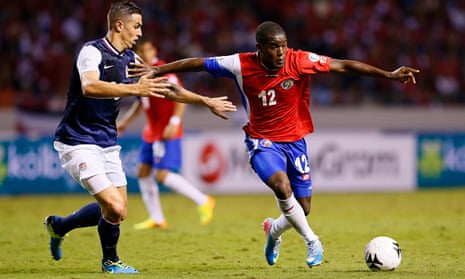This article is part of the Guardian’s World Cup 2014 Experts’ Network, a co-operation between 32 of the best media organisations from the countries who have qualified for the finals in Brazil. theguardian.com is running previews from four countries each day in the run-up to the tournament kicking off on 12 June.
In March 2011 the Costa Rica team was in Honduras preparing for the Under-20 World Cup as speculation increased regarding which players Ricardo La Volpe, the head coach, would select for the senior side’s upcoming friendly matches against China and Argentina.
The young players of that generation, born in 1992 and 1993, came together to get tickets to the friendly games; most did, but Joel Campbell did not. When one of his team-mates asked him if he wanted to go, he replied: ”I want to go, and I will go, but as a player.” On 18 March, La Volpe made his call and Campbell was selected for the senior squad.
Campbell’s main virtue is his mentality. One may think his answer was mere youthful confidence, but it was later demonstrated to be a true reflection of his character.
“I’ve always said that success goes hand in hand with sacrifice. I’ve always said you have to think about winning. We teach him to set goals for the short, medium and long term,” says Humberto Campbell, Joel’s father.
As a son of a football family, the ball was always a fundamental part of his DNA and for his dad it was essential from an early age to learn values such as discipline and dedication. He celebrates his goals with a salute as a way to report to his cousins.
Michel, the Olympiakos coach who has had the young forward on loan from Arsenal last season said: “When you work with Campbell you notice his capacity, his desire to train”. This is definitely a family heritage. Joel has three siblings: Nekisha, Humberto and Katherine. The family is the second pillar in his life; the first is God.
In his European adventure, he found support from his girlfriend, Maria Fernanda Cascante, who accompanied him often during his three loan spells, at Lorient in France, Real Betis of Spain and Olympiakos in Greece.
Roxana Samuels, Joel’s mother, revealed that before each match her son reads psalm 27. This practice began as a recommendation from her, but it became the way in which Campbell gets belief for his performances.
During his time with Olympiakos in Greece, his coach and team-mates could see the value of having Maria with him made to Campbell. “He is fortunate to have a partner [his girlfriend] that helps in that regard. He is a player known not only for his athletic achievements, but for his ability to interact with his peers,” said Michel.
The Campbell family has a theory that they need not envy anybody or anything. “All with the same conditions, are equal,” says the father.
In football, the coaches that have had him during his career, define him as a fast attacker with great capacity to take on his opponents. He also has very good dribbling skills and is a good finisher.
“He is technically good and has a good definition,” evaluated Roberto Rios, the assistant to Pepe Mel, the coach during Campbell’s time on loan at Real Betis.
Ricardo La Volpe at the time was surprised by the natural ability of the attacker and even joked that he would buy him if he was at a club.
“The truth guys, I tell you today, he is a two, three million euros player, easy. But you have to work with him, he’s a guy with a great future, if I had money I would buy him,” La Volpe confessed in 2011.
Arsène Wenger, at least, was listening, and moved to sign the then 19-year-old from Deportivo Saprissa, the leading Costa Rican club. In August 2011 Campbell moved to Arsenal, but London was not destined to be his home any time soon.
His failure to qualify for a work permit meant that he was immediately loaned out to the French club Lorient, where he scored three goals in the 2011-12 season.
The following season, in Spain with Betis, Campbell got to work on what was at the time considered to be his weakness; his defensive work.
He developed under the orders of Mel, who had a brief and unhappy stint at West Bromwich Albion last season, a game where he focused on pressing opposing defenders and working hard to win back possession. That has helped him no end and, as Manchester United found out in the Champions League last season, there is no doubting his finishing ability. England and Roy Hodgson will be hoping they do not see more evidence of it in Belo Horizonte on 24 June.
His goal against United showed how far he has come. He is still only 21, and while the speculation is rife that Wenger will sign one or two big-name strikers this summer, don’t be too surprised if Costa Rica’s Campbell forces his way into the reckoning at the Emirates come August, by which time a few more people may know his name.
Esteban Valverde writes for the Costa Rican newspaper Al Día
